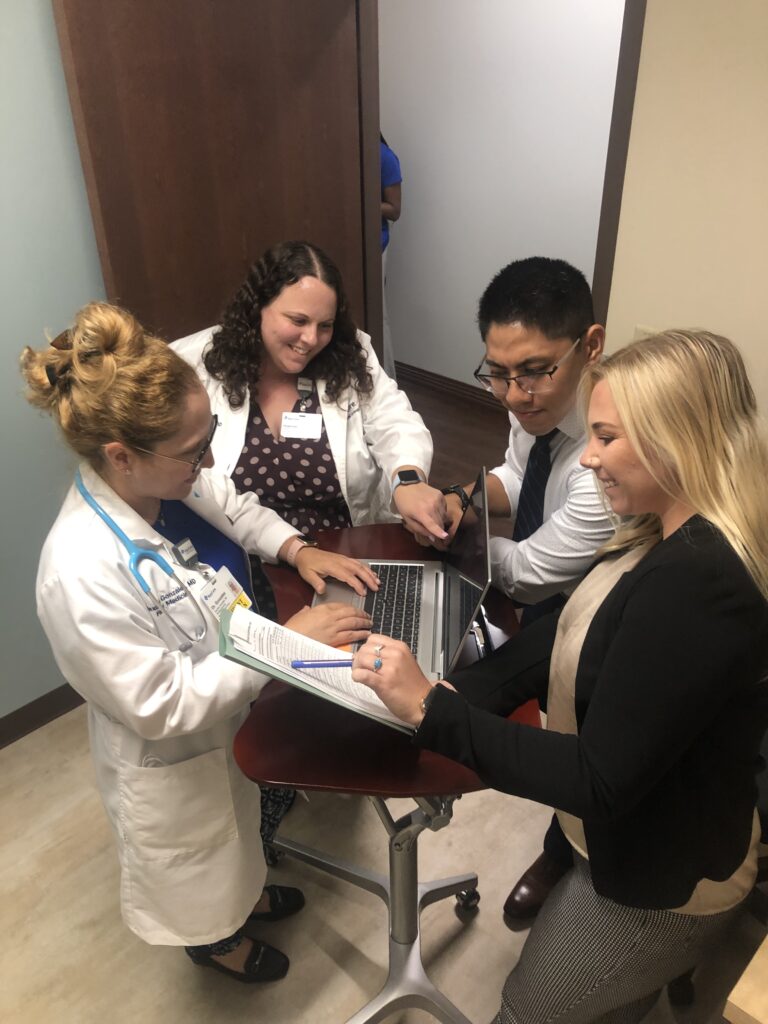Winter Haven Hospital’s First FSU Psychology Interns Help to Expand Care to the Underserved Area
by PAUL CATALA
Ever since Shelby Mathias was a child, she’s felt compelled to help and provide support for those around her.
“Showing compassion to those experiencing adversity was instilled in me by my mother,” she says. Losing her mother at a young age further magnified her desire to provide mental health support for those dealing with difficult life issues. The 26-year-old earned her bachelor’s degree in psychological science from Ball State University. At Nova Southeastern University, she received her master’s degree in clinical psychology and is working toward her doctoral degree there.
One of her peers, 27-year-old Joseph Velasquez, says his desire to go on to help those with mental health issues has steadily grown since getting his bachelor’s degrees in psychology and forensic science from Palm Beach Atlantic University in 2016. He is pursuing his doctoral degree at the Hawaii School of Professional Psychology at Chaminade University in Honolulu.
The two students are the first FSU College of Medicine psychology interns to join Winter Haven Hospital as part of an American Psychological Association-accredited Doctoral Psychology Internship Program. The internship program was based on a 2018 Polk County Community Health Needs Assessment highlighting the need for mental health services in Polk County, especially in Winter Haven and the eastern part of the county. Until recently, Winter Haven had only three psychologists, who provided important assessment and treatment services to improve the mental health of residents. The internship program is a collaboration between the Winter Haven Hospital Foundation and Centerstone, a health system focused on providing mental health and substance use disorder treatments.
Joel Thomas, president and CEO of the Winter Haven Hospital Foundation, also helped initiate the internship program.
Across the U.S., the average mental health provider-to-resident ratio is about 1:310. In Florida, it’s closer to 1:670, according to a 2021 Polk Vision Report. Polk County is even further behind, with a 1:1,190 ratio.
To help level those patient-doctor imbalances, the Winter Haven Hospital Foundation has developed a multi-pronged approach to addressing that need with the internship program at Winter Haven Hospital, including a hospital-based telepsychology program, a clinical training program for Florida Institute of Technology’s third- and fourth-year doctoral psychology students and a mobile medical clinic.
Dr. Shannon Smith, licensed Clinical psychologist and Director of Psychology Training, says she and her colleagues went through more than 150 applications from prospective interns before selecting the two inaugural internship students to start this summer.
Smith says teaming with Centerstone Consortium, a nationally accredited internship organization focused on training psychologists, helped the hospital to establish the internship program. She says the doctorate students are working in a variety of settings by providing individual and group psychotherapy, behavioral health consultations, and conducting neurocognitive and psychological evaluations for concerns such as Autism Spectrum Disorder, ADHD, and dementia.
“There were no clinical psychology training programs in Polk County,” says Smith, who is in her second year at Winter Haven Hospital. “Our goal of having this program is to attract psychologists to the area. If we train them here, we hope they’ll stay here to serve the needs of Polk County.”
Funding for the program comes from the Winter Haven Hospital Foundation, which obtains funding through community donors and county government funds. He says through the funding, interns receive a biweekly stipend that covers basic living expenses, health insurance, free Friday lunches, and weekly breakfasts.
The foundation also funds continuing education programs, such as a national health conference at Northwestern University in Chicago in July. where Mathias presented her research.
“That (funding) allows me to further my education which, in turn, advances my career. That would be difficult to do without the support of the hospital foundation,” says Mathias, who applied to 22 doctoral internship sites across the country from November to December 2021 before matching with Winter Haven.
The interns also receive a stipend and health benefits as part of the program.
“One of the big benefits of this training program is psychology’s integration with family medicine,” says Smith. “Family medical doctors are the largest prescribers of mental health-related medications. Therefore, this integration helps the interns and physicians to learn from each other and improve the care of their patients.”
Working toward that goal keeps the interns busy.
Since beginning the internship, Mathias and Velasquez say their 40-hour work weeks are full. In addition to working in primary care, the students also conduct neuropsychological assessments with Dr. Jeffrey Reddout, Winter Haven Hospital neuropsychologist, on patients with dementia, TBIs, strokes, and other neurocognitive conditions. They also work in the primary care clinic providing assessment and treatment services.
The two doctoral students say they are encouraged as they proceed through their internships.
“I feel supported and valued because my supervisors invest in me both personally and professionally,” says Mathias, who particularly enjoys providing trauma-informed, person-centered psychotherapy and being a consultant to address psychological aspects of health and wellness in primary care. “They respect my time, encourage a healthy work-life balance, and help meet my individual training goals.”
Velasquez says he’d like to one day start an interdisciplinary healthy changes clinic, which would include a pharmacist, family medicine resident and interns.
“Mental health is not a separate aspect of one’s life experiences,” he says. “Mental health plays an integral part of physical, mental, and spiritual well-being. I think this program will help future practitioners to better recognize, practice, and address mental health illnesses.
